Wondering how to budget for your startup? Try using a startup budget template. Not only is it a great way to organize your startup’s finances, but it’ll give you peace of mind knowing you have enough resources to get your small business up and running.
In this article, we’ll discuss the monday.com startup budget template. But before we dive into that, we’ll talk about what a startup budget template is and how it can make or break your business.
What is a startup budget template?
A startup budget template helps you budget and estimate all the costs involved in launching your business. And they can make a huge difference in whether your startup soars or struggles to get off the ground.
A robust startup business budget template typically includes a list of “startup expenses,” like office space, inventory, marketing costs, and so on. Also, many top-notch templates are customizable, letting you add or subtract budget line items to better reflect your business.
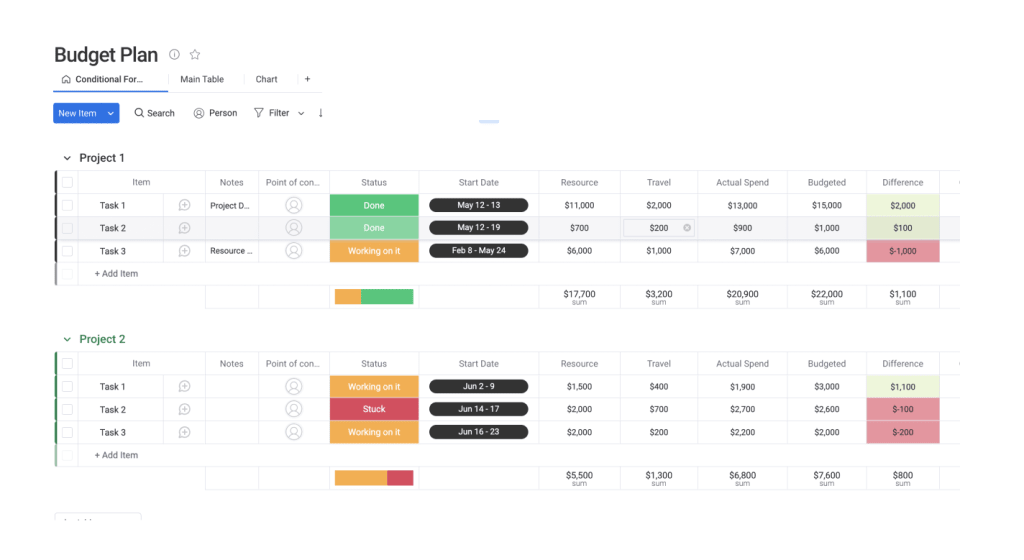
Regardless, there are a few key components you’ll see in every startup business budget template:
- Operating expenses: ongoing costs of running your business, like rent, utilities, and payroll
- Capital expenses: assets your business needs to make money, like inventory or equipment
- One-time expenses: startup costs that you’ll only incur once, like land acquisition or certain legal fees
- Revenue projections: estimates of how much money your business will generate over a given period
- Break-even point: the amount of revenue your startup needs to reach before making a profit
Bringing a startup to life is no easy task. Thankfully, the right budgeting template can help keep your finances in check, so your business has what it needs to succeed.
Why use a startup budget template?
Financially, a startup budget template helps keep a young company from going broke. But what about the other advantages of using one? Let’s explore a few of those benefits below.
You won’t miss important financial considerations
Many startup budget templates are pre-populated with lists of important financial information. This can be a lifesaver for startup founders who might overlook key expenses.
Underestimating your startup costs can put you in a vulnerable position and cause cash flow issues down the line. And the last thing any up-and-coming company wants is to go under before they’ve had a chance to start making profits. With a startup budget template guiding your financial planning, you can feel confident that you’ve accounted for every expense.
You’ll make better hiring decisions
One of the most important aspects of any startup budget is projecting your revenue and expenses into the future. This exercise can help you determine when and how to hire new employees.
For example, let’s say your startup is growing quickly and you’re thinking about hiring a new salesperson. But after looking at your budget, you realize that you won’t be able to afford a full-time salary for another six months. In this case, you might decide to hire a part-time or commission-based salesperson instead.
It’s a great asset for landing investors
A sound business plan and a detailed budget are essential for securing additional funding from investors — or when applying for a loan. Without either of these documents, it can be difficult to convince someone that your startup is a wise investment.
Organizing your budget with the right template can help investors see that you’re serious about your startup and that you’ll use their money strategically.
Startup budget templates empower you with the confidence to make your business a success. They can help steer your financial planning so you can achieve your startup dreams.
The right startup budget template for you may depend on your specific needs.

What are some examples of startup budget templates?
It’s one thing to talk about budgeting, it’s another to see it in action. From annual budgets to restaurant budgets, here are a few different ways you can get started.
Annual startup budget template
An annual budget template gives you a 12-month overview of your finances. With it, you can plan — in detail — where every dollar goes during your first year in business.
By breaking down every revenue stream, investment, and expense into monthly projections, you can test scenarios and find the best way to allocate your financial resources. This can be helpful when calculating your “burn rate” — the rate at which you’re spending money — and when making decisions about things like hiring and expansion.
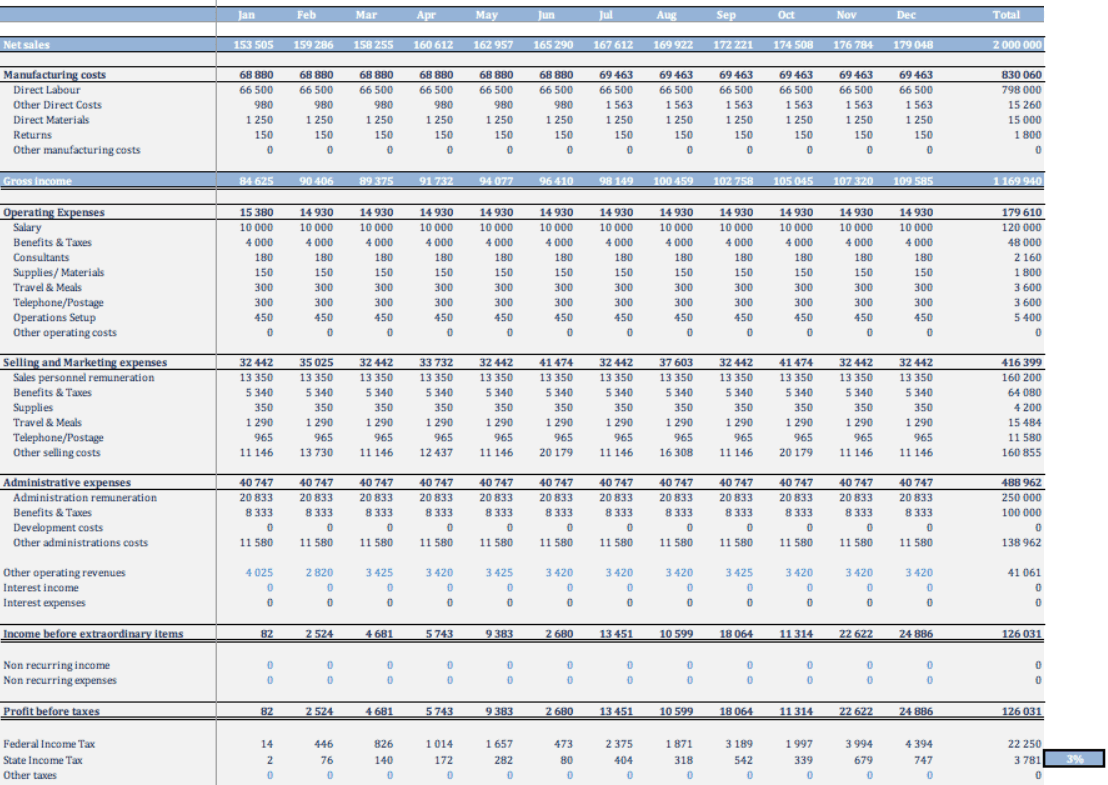
Savvy business owners use an annual budget to make better financial decisions. By analyzing actual income and expenses against their budgeted amounts, they can tweak next month’s budget based on what they’ve learned the month before.
Break-Even startup budget template
A break-even template calculates how much money you need to make to cover your total costs and start turning a profit. Break-even analysis is a crucial part of any startup budget, as it can help you determine whether your business is viable.
With these templates, you’ll list your startup’s fixed and variable costs. Fixed costs are expenses that don’t change, while variable costs change with the amount of product or services you sell. Once you have all this information, the template uses pre-built formulas to calculate your break-even point.
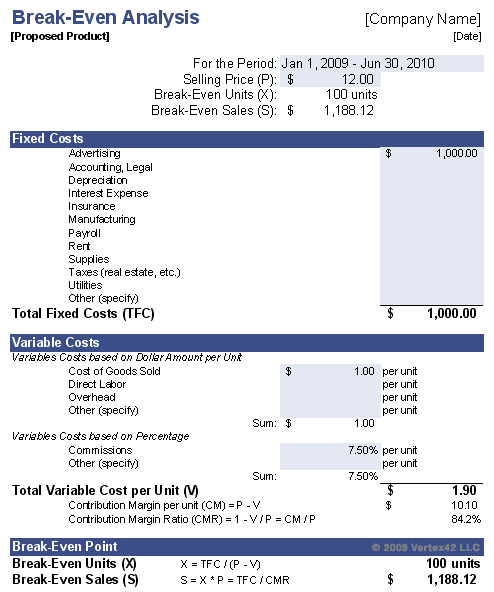
Don’t overlook your break-even point when putting together your startup budget. Not only can it impact how you price your products and services, but it can also influence other decisions like how much inventory to carry.
Restaurant startup budget template
A restaurant startup budget template is a great tool for anyone opening a new pub, cafe, or eatery. In addition to the standard categories — like rent, marketing, and overhead costs — this template includes line items specific to restaurants, like food and beverage costs.
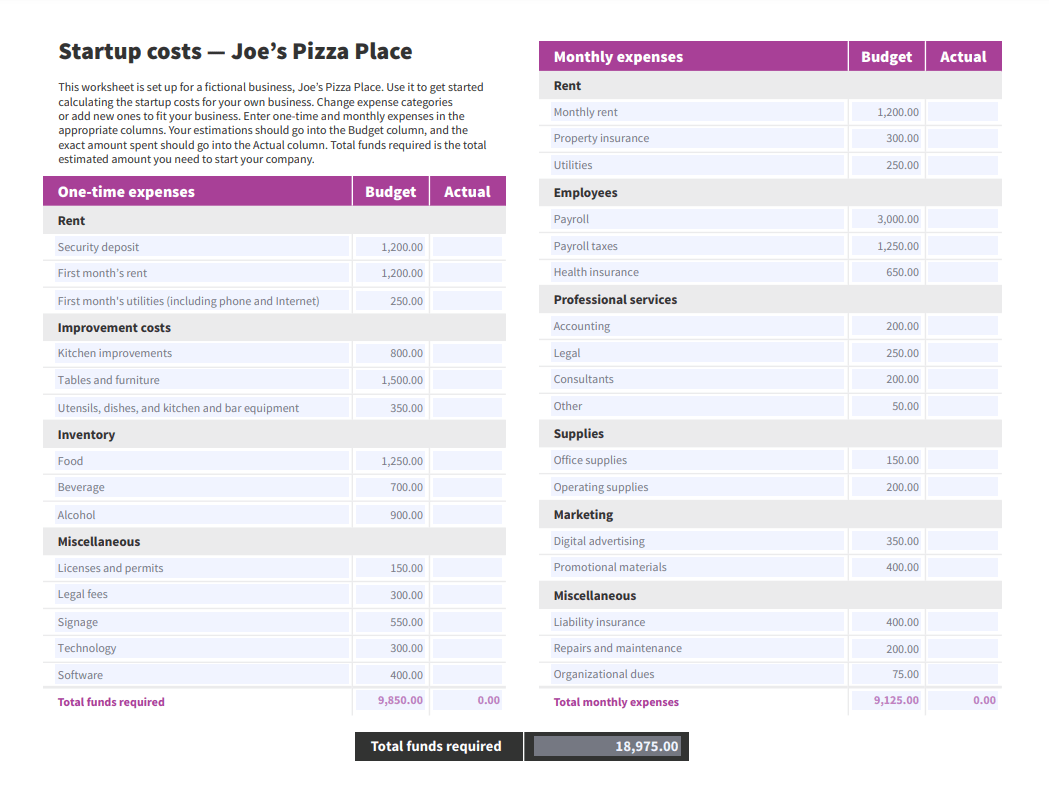
Creating a budget for a restaurant startup can be tricky, as there are so many variable costs involved. By using a template, you can make better decisions about things like menu prices, portion sizes, and how many servers and kitchen staff you need. But there’s one more template we haven’t discussed yet that takes budgeting to a whole new level.
monday.com’s startup budget template
Our template is a complete budgeting solution that can help your startup go the distance. Backed by all the firepower of the monday.com Work OS — a digital workspace that helps you work without limits — creating a startup budget that impresses investors and soothes finance stress will never be easier.

Let’s see how monday.com can help you stay on budget and in control of your finances.
Powerful visualizations help you grasp important information quickly
Create dynamic dashboards that highlight all your key financial information. Customize your views by adding tables, graphs, and charts so you — and your investors — can see your progress at a glance.
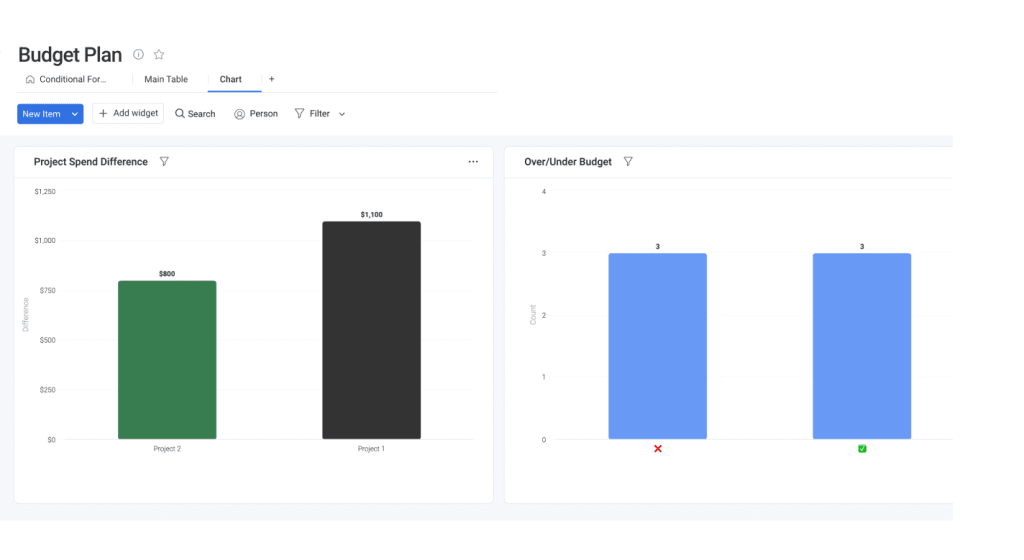
Built-in formulas make it easy to analyze data
Calculate your break-even and track your burn rate and other important metrics using our built-in formulas. You can also perform complex calculations to get whatever budget information you need to help guide your business decisions.
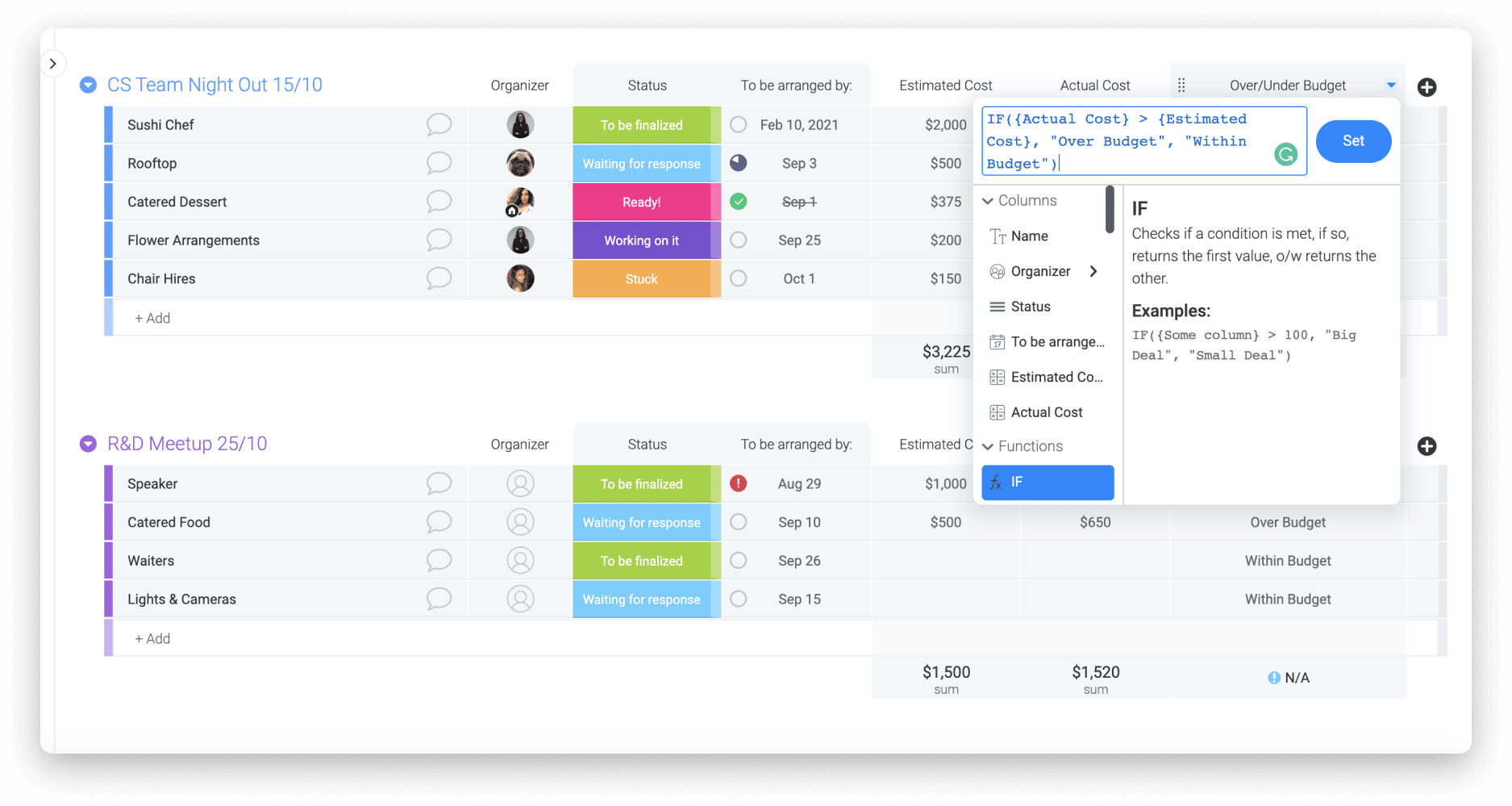
Conditional Coloring points out critical financial details
With Conditional Coloring, you can flag key financial data — like if you’re spending too much — for quick and easy reference. This information comes in handy if your budget needs adjusting for the month ahead.
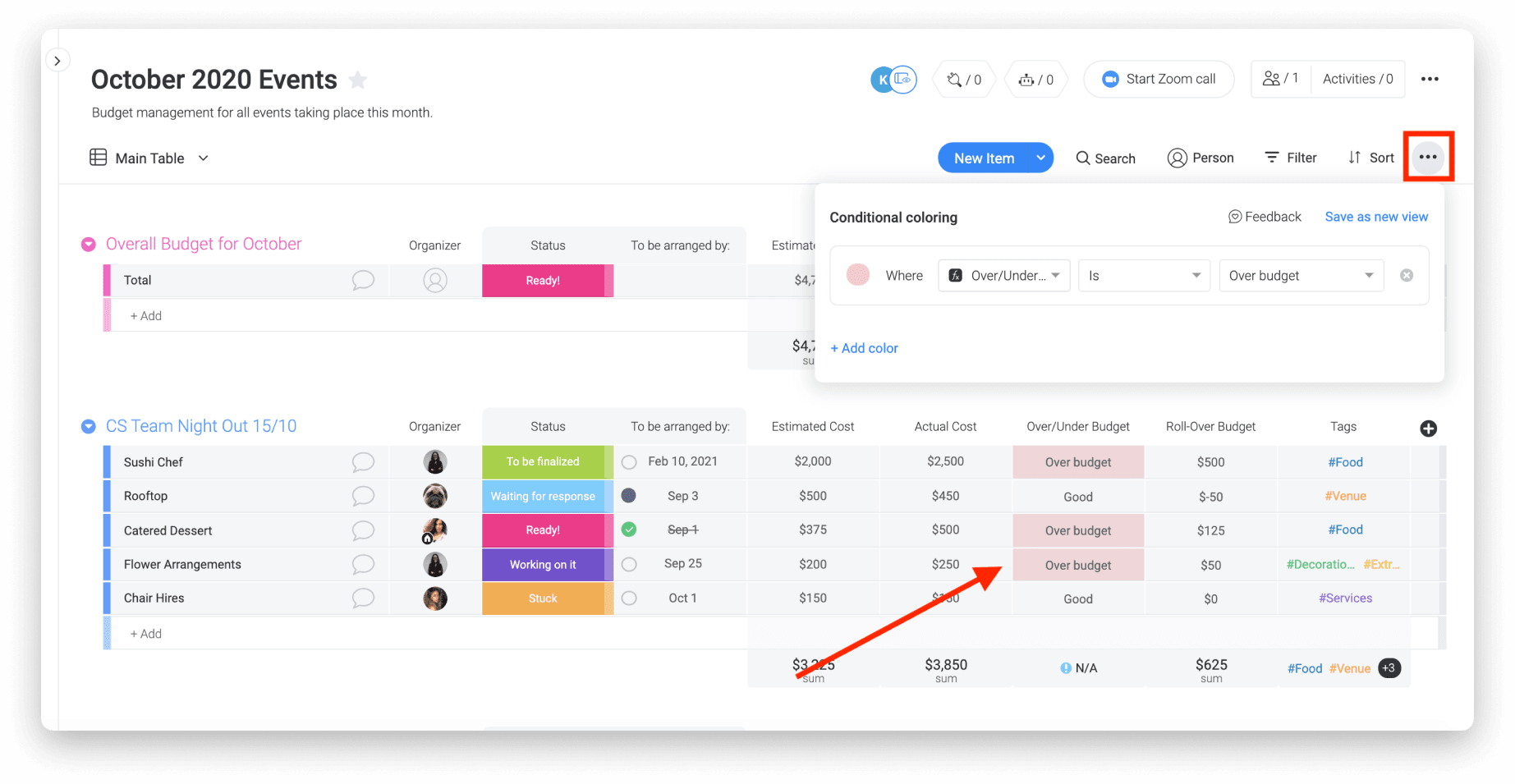
With the monday.com startup budget template, you’ll automatically have everything you need to successfully budget for your startup.
Now that you’ve got the startup budget template of your dreams, it’s time to learn how to put it to work.
Startup budget template tips & tricks
If you’ve never created a budget before, they can look intimidating. Don’t sweat it, we’ve got a few tips and tricks to help get you started.
Prioritize your expenses
Not all expenses are created equal. When budgeting, prioritize your spending based on what’s most important to your business. For example, if you’re a tech startup, you may want to allocate more of your budget to research and development so you can bring your product to market faster.
Don’t forget your fixed costs
Fixed costs are an important part of any startup budget, so don’t overlook them when building your budget. Things like rent, insurance, and payroll can be major expenses for startups, so make sure to factor them in.
Keep it flexible
Your startup budget should be flexible enough to accommodate changes in revenue and expenses. As your business grows, you’ll want to adjust your budget to reflect those changes.
Make it easy to understand
When creating your startup budget, make sure it’s easy to understand and use. If it’s too complicated, you’ll be less likely to use it, defeating the purpose.FAQs about startup budget templates
How do I create a startup budget?
You can create a budget for your startup in seven simple steps:
- Determine all your essential one-time costs and capital expenditures
- List all your fixed and variable monthly expenses
- Estimate funding from investments, bank loans, and savings
- Estimate your expected monthly revenue
- Calculate a break-even point
- Calculate your total business startup cost
- Review and adjust your budget
What should be included in a startup budget?
At the very least, a startup budget should include:
- Fixed expenses
- Variable expenses
- One-time expenses
- Sources of capital
- The break-even point
- Revenue projections
You can add more fields and data if you — or potential investors — want a more detailed picture of your future finances.

